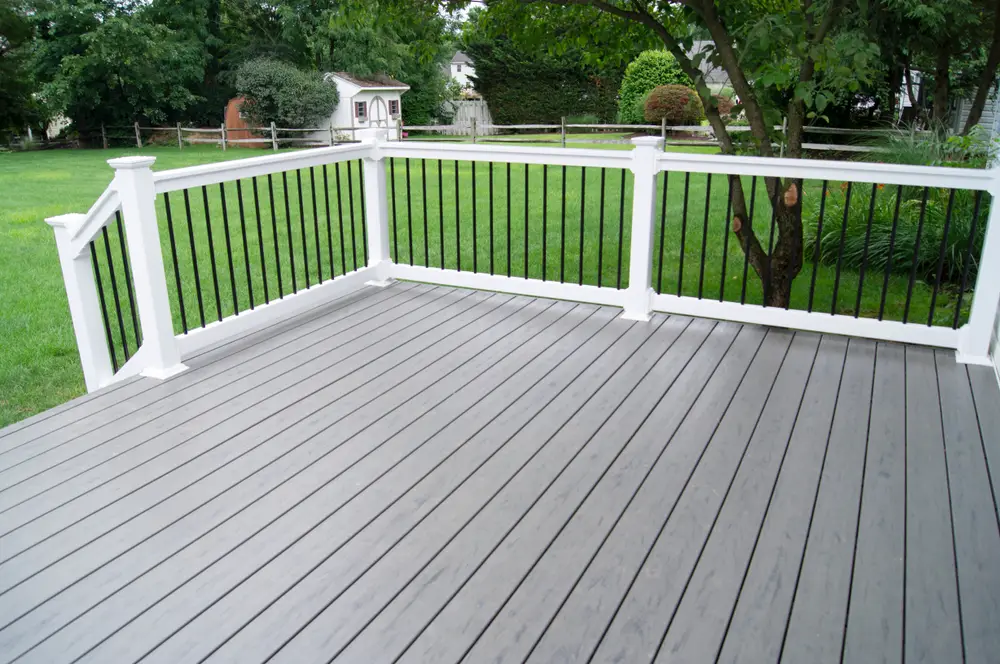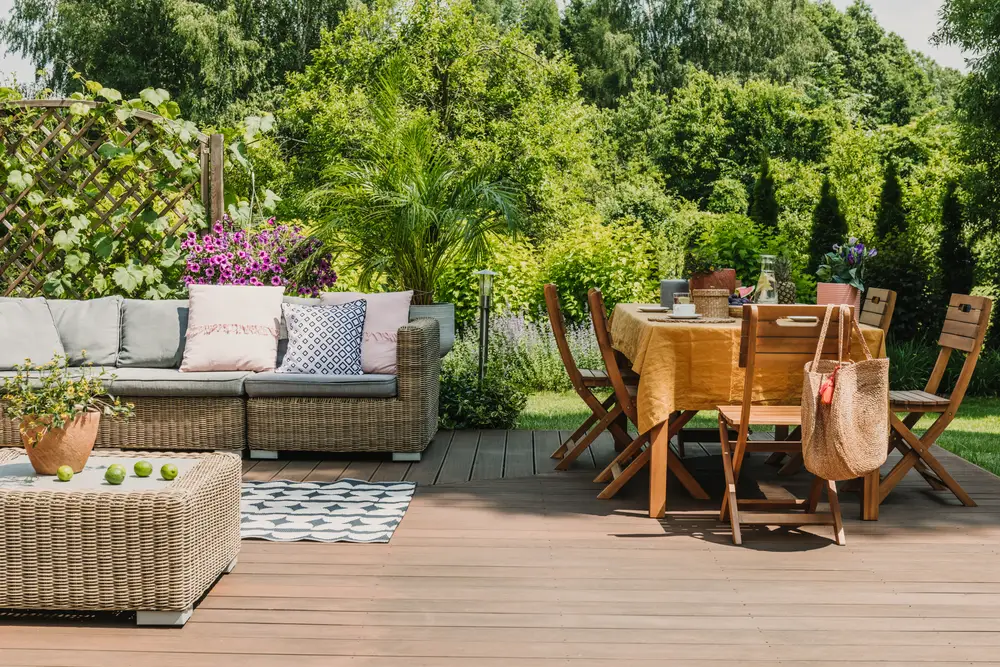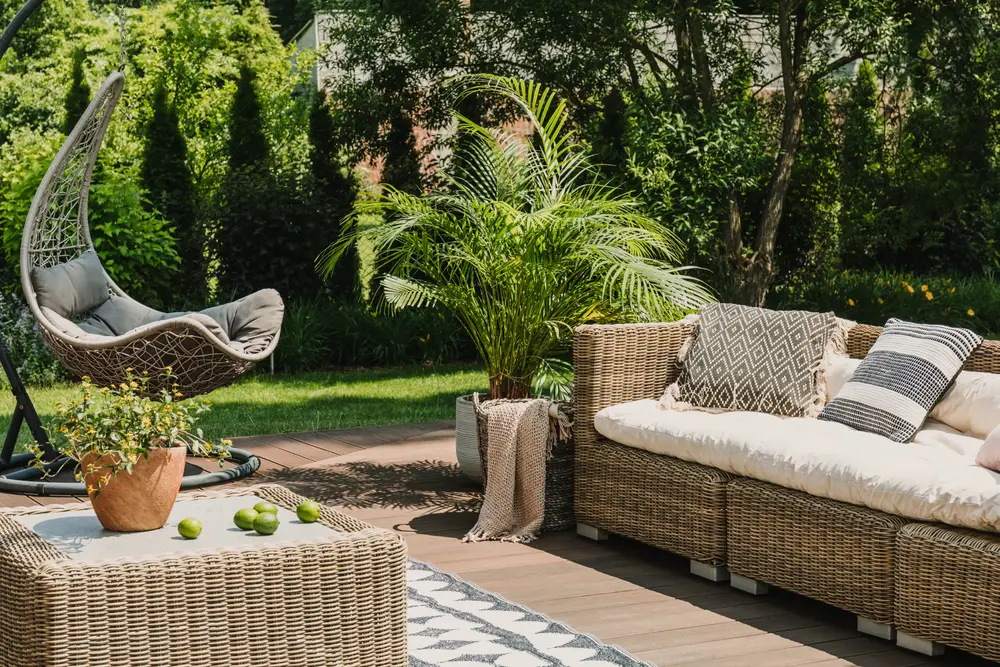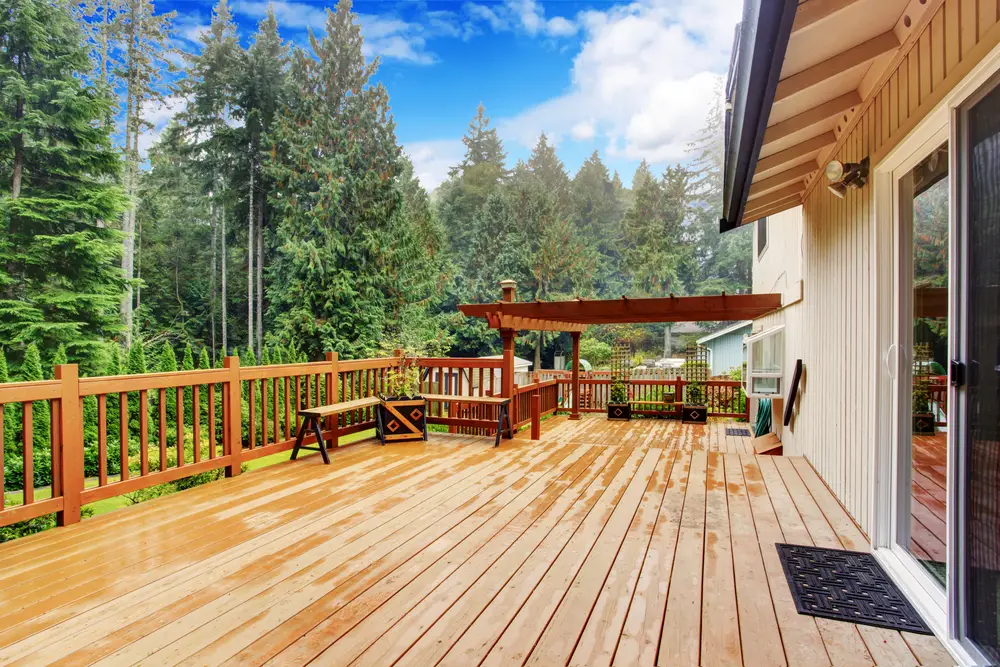Though both decks and patios are great options to consider, choosing one over the other can be a challenge, and that’s where this guide comes in! We’ll walk you through a deck vs patio comparison to help you choose the more suitable option for your needs.

Without further ado, let’s jump right in!
Table of Contents
Deck vs Patio: Differences

Let’s start by explaining both structures for those who don’t fully understand the difference between a deck and a patio. This should also help you build a mental image of the two structures before heading into the aspects of comparison.
A deck is typically an outdoor platform that’s designed so that it extends to the outside of the house. The surface is typically flat and made from a material capable of supporting the weight of multiple adults, as well as furniture.
Since a deck extends from the house itself, it’s usually built in an elevated level of the house, which is why they’re usually fenced for safety and features a flight of stairs that will lead you into the rest of the landscaping in your household.
Patios, on the other hand, are ground-level extensions of the property that are typically made of concrete, paver stone, or bricks. They’re adjoined or connected directly to the house and can be either left in the open or surrounded by trees and shrubs.
Deck vs Patio Comparison

Now that you know the architectural definition of both decks and patios, it’s time to compare them according to the most essential aspects for a home renovator.
1. Durability
The durability of a building structure is one of the main assets that any home renovator has to consider. Since durability can take many forms, we’ll be focusing on the sturdiness and resilience of both structures against damage and how long you should expect them to last without needing renovations.
For starters, keep in mind that decks are made of wood while patios are made of stones and concrete. In other words, you should expect the patio to stay in good shape for longer than a wooden deck.
Wood is typically affected by the weather and will rot internally over time, which causes it to break down. However, patios are also prone to irreversible staining and cracks, especially if you live in an area with extreme weather fluctuation.
In terms of sheer years of service, patios usually outlast decks. However, with proper care and maintenance, both of them will survive the test of time.
2. Privacy
If you’re mainly building a structure for the sake of maintaining your privacy, a patio is a better choice. This is because patios are built closer to the house and on ground level, which gives you a more flexible design if you want to maintain your privacy.
In addition to the low-profile design of a typical patio, it’s easily surrounded by trees and shrubs to make it more private. Even better, the patio can be surrounded by a wooden roof for added privacy. (Check out these 15 Enclosed Patio Ideas for inspiration!)
On the other hand, the elevation of the decks above the ground will somehow seem like you’re on a pedestal above fence coverage.
3. View
Speaking of elevation, that doesn’t necessarily mean that the deck’s high-profile design doesn’t come with its own benefits!
Since decks are usually built higher above the ground, they usually offer quite a nice view, which is a great thing if you live close to a lake, open fields, or any other nice scenery.
Even if you don’t have scenery, the elevation of a deck also allows you to overlook your entire backyard and enjoy the beautiful horizon.
Once again, this will depend on what’s surrounding your house, as you might be surrounded by neighbors from every side.
4. Suitability For Uneven Terrain
One of the main reasons for patio cracking problems is that they require extremely even and flat ground to be built on.
In fact, a piece of land might seem flat enough to the eye but not to the concrete that’s built over it. That’s why you need to measure the level of flatness of the land where you’re going to build a patio, especially if there are some small hills here and there.
On the other hand, the flatness of the ground isn’t a major concern while building a deck, as you’ll eventually set the entire thing over supporting beams.
All in all, the flatness of your landscape has a major impact on your choices and how much it’s going to cost you, especially if you lean more to the patio side.
5. Cost of Building
The cost of building a deck or a patio is directly related to both materials and labor costs. Ideally, building a deck typically costs more than a patio because wood costs more than patio materials, and you’ll usually need more of it.
Also, building a deck requires more work experienced craftsmanship, which also translates to a higher cost. Ideally, you should expect a square foot of a deck to cost you anywhere from $15 to $30.
On the other hand, a patio offers a wider variety of material choices, with concrete being the most affordable option. A square foot patio should cost you anywhere from $5 to $15, depending on the building material.
6. Maintenance
Patios don’t require any kind of regular maintenance except for cleaning to avoid staining. On the other hand, wooden decks need proper sealing and restaining every few years to keep them in good shape.
7. Customizability
Both options are pretty versatile when it comes to customization. However, wood can be primed and painted to match the color of the house or backyard decor.
Also, since there are more elements to decks than patios, such as rails, fences, and stairs, there’s more room for customizing the structure according to your personal taste.
8. Heat Resistance
Since you’re most likely going to use the structure in summer, you want it to absorb as much heat as possible to stay cool enough to step on.
Wood is a natural heat insulator that has an excellent ability to absorb sunlight without retaining or radiating too much heat.
On the other hand, concrete and paving stones can get extremely hot during the summer. In fact, if you crack an egg open on a sun-exposed sidewalk, the egg will cook, so imagine the scalds from accidentally stepping on a hot patio barefooted!
Not to mention, too much heat and cooling off at night will also speed up the cracking process of concrete patios.
9. Weight Restrictions
Weight is never a problem for a patio because it’s built on the ground, so it has a natural level of solid infrastructure that’s capable of supporting just about anything!
On the other hand, decks are supported using beams and other architectural means, which is heavily affected by how sturdy the base is and the type of wood used for building.
The more furniture and amenities you want to add to your deck, the more expensive it’s going to be.
10. Needing a Permit
Depending on where you live, building a deck might be regulated by the law and you may need a certain permit or any other legal requirements before building one.
This is because a deck changes the appearance of a house and must ensure safety to the homeowner, as well as others.
On the other hand, patios shouldn’t require any legal permission, inspections, or waiting period before building one.
11. Safety Concerns
Both decks and patios are pretty safe and secure when they’re built properly. However, patios have a habit of forming a slippery layer of ice on cold days that can be quite slippery if you’re not careful.
Similarly, decks are built at an elevated level that may cause some concerns about falling. However, this shouldn’t be a problem if you build a sturdy railing or a fence.
12. Resale Value
Lastly, if you’re building the outdoor extension as a form of investment to improve the value of your property, then you should consider the return on investment (ROI) and resale value of each of them.
According to most remodeling calculators, building a deck has one of the highest return on investment values of all projects, with an expected ROI of about 70% to 80%!
Wrap Up: Which One Should You Go For?

With all that said, you now have a complete guide that puts household deck vs patio in a head-to-head comparison.
As you can see, each of them has its own set of pros and cons. However, with the help of this guide, you’d be able to pinpoint the suitable option for you based on the most essential aspects for you!